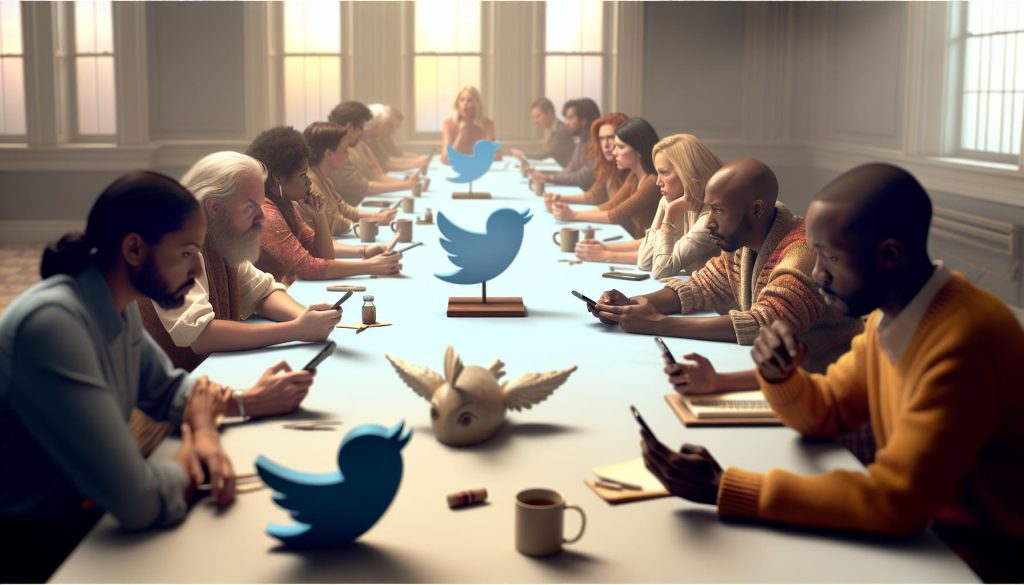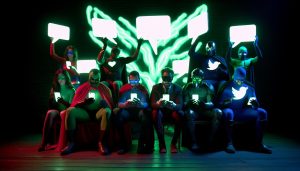In a world where every tweet can spark joy or chaos, the phenomenon of celebrities firing back on Twitter is both entertaining and enlightening. “Make Tweets Mean Again” dives into how stars combat negativity and reclaim their narratives in a space known for its sharp wit and unpredictable dynamics. As social media continues to shape public perception, understanding the impact of these celebrity confrontations not only highlights the emotional stakes involved but also reflects broader conversations about accountability and authenticity. Ever wondered why a simple tweet can ignite headlines and fandom battles? Join us as we explore the art of the Twitter comeback, dissect viral moments, and provide insights that will empower you to navigate the social media landscape with confidence and flair. Ready to get the scoop on the tweets that matter? Keep reading!
Make Tweets Mean Again: Understanding Celebrity Engagement on Twitter
Engaging with celebrities on Twitter can be a wild ride, especially when the stakes are high and egos are involved. With the platform’s instantaneous nature, a single tweet can swing the tide of public opinion, elevate a feud into viral territory, or inspire collective laughter in a shared experience known as “Mean Tweets.” As audiences, we revel in the spectacle of celebrity clashes, often resulting in trending hashtags and memes that have the power to shape culture. Understanding how these stars choose to engage, and sometimes retaliate, can provide valuable insights into the complexities of online celebrity interactions.
Celebrities approach Twitter engagement in a myriad of ways, often using their platform to combat negativity or show their authentic selves. When faced with criticism, some resort to humor-a strategic move that not only diffuses tension but also invites fans into their world. For instance, many celebrities have embraced the “playful roast” style, making light of their critics while boosting their own image. This isn’t merely about fighting back; it’s a calculated strategy to turn potentially damaging tweets into opportunities for connection and entertainment.
To truly understand the dynamics of these Twitter feuds, it helps to look beyond the surface. Analyzing the underlying psychology reveals common triggers for these clashes, such as jealousy, misunderstanding, or the need for validation. Celebrities are, after all, human, driven by emotions just like the rest of us. When they respond to criticism with wit and charm, they often reshape the narrative, turning detractors into fans. This phenomenon illustrates the power of response; with the right mix of charisma and humor, a public spat can become a testament to a celebrity’s authenticity and relatability.
As we dive deeper into the world of Twitter and its cultural implications, it’s essential to adopt best practices for navigating online dramas. Developing a supportive community around positivity rather than negativity can go a long way in establishing a celebrity’s brand. Whether you’re a fan, a brand, or even an aspiring influencer, understanding these dynamics can enrich your social media strategy. By examining how these stars employ humor, engage their critics, and create entertaining exchanges, one can glean essential lessons about building meaningful connections in the fast-paced digital landscape.
The Evolution of Celebrity Twitter Feuds
The landscape of celebrity feuds on Twitter has transformed from the old-school public spats that dominated tabloids to a new era where snappy tweets can make or break a public figure’s image in mere minutes. It all began with the dawn of Twitter, when celebrities realized they could interact directly with fans and critics alike, without the mediation of traditional media. The accessibility of 280 characters allows for instant reactions that often spiral into viral phenomena-this is where the magic happens. Remember when Kanye West and Taylor Swift reignited their infamous feud over a poorly-timed video? That was just the beginning of Twitter drama becoming a staple of internet culture.
As the platform evolved, so too did the tactics celebrities employ during these Twitter clashes. In the early days, feuds were often blunt and aggressive, marked by direct insults and public denouncements. Now, savvy stars have learned the art of the “tweet subtweet,” where they can take jabs without naming names, creating an air of mystery and intrigue. Consider the ongoing ribbing between stars like Ariana Grande and Pete Davidson-or how Drake and Pusha T used veiled references to air their grievances. This approach not only fosters engagement but also keeps the audience guessing, turning feuds into a game of social media chess.
Humor: The New Weapon of Choice
It’s not just about the punchy comebacks anymore; humor has become an essential tool in a celebrity’s Twitter arsenal. When faced with criticism or an onslaught of trolls, multiple stars now prefer to respond with wit instead of rage. Take Mindy Kaling, who famously turned a negative comment about her show into a clever quip that went viral for all the right reasons. This strategic use of humor doesn’t just disarm critics but can transform the narrative entirely, changing a potential backlash into a trending topic filled with laughter and engagement.
The strange alchemy of celebrity feuds is also reflected in how the public interacts with these exchanges. Fans don’t just observe; they participate, creating memes and hashtags that perpetuate the drama. Every feud generates a swarm of memes- from the classic “Mean Tweets” segments on late-night TV to fan-made GIFs and edit that go viral in hours. In this ecosystem, fighting back on Twitter is as much about entertaining your audience as it is about settling scores or defending your name. As such, sticking to a positive framework is vital, as the trolls and negativity can transform what could have been light-hearted into a full-blown scandal overnight. In the wild west of Twitter, knowing how to engage-and when to take a step back-can define a celebrity’s brand.
How Celebrities Use Humor to Combat Negativity
In today’s hyper-connected world, humor has emerged as a powerful weapon for celebrities navigating the often treacherous waters of Twitter. Gone are the days when stars would simply fire back with venomous comments. Now, the clever quip reigns supreme, exemplifying how lightheartedness can convert negativity into engagement. Think of Kevin Hart, whose ability to crack a joke in response to criticism not only diffuses tensions but also invites fans to join in on the laughter, creating a shared moment of levity amidst online drama.
When celebrities harness humor effectively, they not only defuse potentially explosive situations but also transform them into opportunities for connection. For instance, take how Billie Eilish humorously addressed her infamous viral moment at the 2020 Grammy Awards with a playful tweet that contextualized her reaction. By framing her response with self-deprecating humor, she not only quelled the trolls but also encouraged positivity from her fanbase. Utilizing this approach can help public figures maintain their brand image while creating a relatable persona that resonates with their followers.
Moreover, the interplay of memes and witty repartee creates a feedback loop of engagement. Fans begin to circulate these humorous exchanges, crafting memes and parody accounts that further amplify the original joke. This is evident in how Ellen DeGeneres’ “Mean Tweets” segments have allowed celebrities to take ownership of public ridicule with laughter, transforming a potentially damaging scenario into an endearing moment. Consequently, the original negativity is recontextualized, minimizing the threat and maximizing audience engagement.
Ultimately, humor acts as both a shield and a sword for celebrities on Twitter. By responding to criticisms with wit, they don’t just protect their public image; they also cultivate a supportive community of fans who appreciate their ability to take things lightly. This technique, when executed thoughtfully, reinforces their brand while inviting followers to engage in a conversation that benefits everyone involved-demonstrating that sometimes a laugh is the best response to negativity.
Behind the Scenes: Viral Tweets That Made Headlines
In the fast-paced realm of Twitter, a single tweet can spiral into a viral phenomenon, stirring up headlines and conversation at lightning speed. Celebrities navigating this chaotic landscape have often turned to Twitter not merely as a platform for promotion but as a battleground where comebacks and clever retorts can become instant classics. A prime example is the notorious tweet feud between Taylor Swift and Kanye West, which originated from an acceptance speech interruption and evolved into a series of exchanges that captivated fans, igniting memes, parodies, and extensive media coverage. Such incidents showcase how a string of tweets can redefine celebrity narratives, turning personal conflicts into public conversations.
Celebrities often employ a mix of sarcasm, humor, and unexpected twists to keep the audience engaged during these viral moments. When Ellen DeGeneres tweeted a lighthearted jab at a fellow A-lister about their red carpet fashion, it didn’t just spark laughter-it encouraged a wave of fans and fellow celebrities to pile on with their own playful commentary, transforming it into a community event. This engagement shows that when celebrities embrace the chaos, they can foster a sense of camaraderie around even the snarkiest tweets.
Memorable Moments that Shook the Internet
Among the iconic moments, the “Mean Tweets” segment on *Jimmy Kimmel Live!* frequently highlights celebrities reading aloud some of the most comically harsh tweets directed at them. This blend of candidness and humor not only humanizes these public figures but also effectively turns the tables on trolls, allowing celebrities to reclaim power over negativity. As viewers laugh along, it demonstrates that celebrities, too, can be vulnerable and relatable in the face of social media criticism.
- Ryan Gosling: Showed how to turn the tables on haters when he read a tweet stating, “Ryan Gosling is the perfect example of why you should wear a condom.” His chuckle and witty retort exemplified how to turn a jab into a laugh.
- Selena Gomez: Who famously joked about her own “mean tweets” during the segment, reminding fans that positivity is the best antidote to online cruelty.
Ultimately, viral tweets that make headlines often revolve around moments of transparency where celebrities flip the narrative, demonstrating that humor can stitch together even the most contentious interactions. Through these exchanges, fans get a glimpse into the personalities behind the public personas, making the online experience all the more authentic and engaging. As these stories permeate the digital landscape, they exemplify how a well-timed tweet can resonate far beyond the initial post, prompting discussions, celebrations, and a shared sense of community amidst the chaos of celebrity culture.
Analyzing Famous “Mean Tweets” and Their Impact
In the whirlwind world of Twitter, “Mean Tweets” have become a paradoxical treasure trove of both humor and self-reflection for celebrities. These brief moments often transform online criticism into a shared spectacle, where public figures take back the power by turning harsh judgments into laughable anecdotes. The result? A collective catharsis that not only entertains but also reshapes the narrative around the individual behind the fame. By confronting negativity with wit, celebrities invite their audience to join in the joke, which humanizes them and fosters a playful dialogue.
Take, for instance, the iconic segment from Jimmy Kimmel Live! where stars read mean tweets about themselves. This recurring segment highlights how even the most elevated presents can be subject to ridicule. Going beyond just a television gimmick, it serves as a cultural lens into the vulnerabilities of fame. Each time a celebrity reads a nasty comment-whether it’s Ryan Gosling being compared to a “condom-needed” scenario or Selena Gomez quipping about her own harsh critique-they don’t just laugh; they also invite their fans to understand that everyone is fair game in the comedy of life. Here lies the brilliance: when celebrities laugh alongside their critics, they fracture the power dynamic and level the playing field.
The impact of these exchanges is profound. First, they create a shared sense of community among fans who revel in the humor, even making a communal sport of roasting their idols. Secondly, they serve as a subtle reminder for the audience about the reality of social media-it’s a place where everyone can cast opinions, but it doesn’t diminish the essence of the individual behind the screen. When celebs respond to hate with humor, they effectively teach their followers how to combat negativity in their own lives, prompting conversations around resilience and self-acceptance.
Furthermore, analyzing these moments demonstrates how “Mean Tweets” morph from potential harm into a vehicle of empowerment. By flipping the script, celebrities showcase that fighting back doesn’t always mean an angry retort; sometimes it means laughter and levity. For anyone navigating the often tumultuous landscape of social media, embracing this approach can be a game-changer, encouraging them to savor the absurdity and stay grounded amid online chatter. So next time you encounter a mean tweet, remember: with a quick wit, you might just turn the tide in your favor.
The Psychology of Twitter Fights: Why Do They Happen?
In the high-energy atmosphere of Twitter, celebrity feuds aren’t just about exchanging barbs; they’re often steeped in a rich tapestry of psychological undercurrents that drive the drama. At the core of many Twitter fights lies the intense public scrutiny that celebrities face. When someone with a massive following posts, every word they say can ignite a wildfire of reactions-positive or negative. This relentless exposure creates a fertile ground for conflict, as celebrities navigate the fine line between maintaining their public image and expressing their authentic selves.
Motivations behind these confrontations can be complex. For some, engaging in Twitter spats serves as a strategic maneuver to revive their relevance in an industry where distraction is just a scroll away. Consider instances where a celebrity might intentionally provoke another through sly comments-this often sparks viral conversations, making them the center of attention. On the flip side, celebrities who react to criticism tend to showcase the vulnerability that many fans relate to. By defending themselves online, they bring forth humanity amid the glamor, demonstrating that they too feel the sting of hostile comments.
Social media taps into our primal instincts, and this is crucial in understanding why these fights escalate. Animals in the wild engage in aggressive displays to assert dominance or ward off rivals, and humans aren’t that different. A celebrity’s response to an online jab can be a knee-jerk reaction, reflecting deeper insecurities, the need for validation, or simply the urge to reclaim their power. Just as trolls aim to provoke, their targets can find themselves in a psychological tug-of-war, caught between fighting back and rising above the noise.
Understanding the dynamics of these conflict-laden exchanges can empower both celebrities and their audiences. For fans watching these exchanges unfold, it’s an invitation to discuss broader themes-like resilience and the impact of public opinion on mental health. Next time a celebrity claps back, remember: it’s not just a witty comeback; it’s a multifaceted interaction that reflects the complexities of fame in the age of social media. By engaging in these dialogues, both parties can play a part in reshaping how we communicate online, proving that behind the pixelated screens, real emotions and psychological strategies are at play.
Turning Critics into Fans: When Celebrities Respond
In a landscape where tweets can spark viral reactions within seconds, the way celebrities respond to criticism often plays a crucial role in transforming detractors into loyal fans. Think of celebrity Twitter interactions like a high-stakes game of chess; one wrong move and it could backfire, but a clever response can win the crowd over. When a star audaciously claps back at a troll, it’s more than just witty banter; it’s an opportunity to showcase their values and personality, which can resonate deeply with their audience.
For instance, consider when singer Lizzo confronted body shaming comments by posting a positive, empowering message about self-love. Instead of retaliating aggressively, she leaned into humor and authenticity-this approach not just defended her image but also invited fans to rally behind her. When celebrities react with grace or humor, they often turn the conversation from a negative critique to a broader dialogue about acceptance and empathy. This ability to pivot from criticism to community building can elevate a celebrity’s status from merely famous to genuinely admired.
To effectively engage with critics and convert them into fans, celebrities can employ several strategies:
- Humor as a Shield: Using humor to deflect negativity not only lightens the mood but also makes them relatable. Think of how celebrities like Chrissy Teigen utilize playful comebacks to diffuse hostility, showing they don’t take themselves too seriously.
- Inclusivity: Addressing criticism in a way that acknowledges differing opinions while promoting unity can win over skeptics. This often involves inviting more conversations rather than shutting them down.
- Vulnerability: Sometimes, admitting that criticism stung can create a humanizing effect. When public figures share their personal experiences with self-doubt or anxiety, they forge a deeper connection with fans who may face similar battles.
- Proactive Engagement: Instead of waiting for negativity to spiral, celebrities can preemptively engage with fans through Q&A sessions or live streams where they address common misconceptions about themselves.
Ultimately, the ability of celebrities to turn critics into fans lies within their authenticity and willingness to connect. When they engage thoughtfully and reflectively, they not only navigate the tumultuous waters of Twitter feuds with finesse but also create a community that thrives on positivity and support. So next time a public figure addresses their critics, remember: it might just be the spark that ignites a fan frenzy!
The Role of Memes in Celebrity Twitter Exchanges
In the chaotic and ever-evolving world of Twitter, memes have emerged as a powerful tool for celebrities navigating criticism and sparking viral conversations. These visual snippets often encapsulate complex emotions or humorous retorts, resonating instantly with audiences. When used effectively, they can turn a seemingly negative situation into a moment of levity and connection, transforming the narrative around a celebrity’s brand. For instance, when celebrity chef Gordon Ramsay faces backlash, his followers often respond with memes that poke fun at his fierce persona, ultimately making light of the situation and fostering a shared camaraderie among fans.
Memes provide a unique space for celebrities to engage with their audience on a more relatable level. They can humanize stars, allowing them to step down from their lofty pedestals and join the conversation as everyday people. Memes that juxtapose a celebrity’s dramatic reactions with everyday scenarios can illustrate the absurdity of online feuds in a lighthearted manner. This was evident when Ariana Grande faced criticism; instead of clapping back with direct hostility, fans created memes that showcased her humorous side, helping to shift the focus from the negativity to the humor that always surrounds her persona.
Engagement through memes also encourages user-generated content, making followers feel like active participants in the conversation. Celebrities often encourage this by sharing or responding to meme creations, which can further boost a fan’s loyalty and foster a sense of community. By incorporating memes into their online presence, stars can showcase their personalities while simultaneously diffusing tension and addressing controversies without appearing overly defensive or combative.
Leveraging Memes for Engagement
To effectively harness the power of memes in their Twitter exchanges, celebrities can consider the following strategies:
- Stay Relevant: Jump on trending memes or formats to stay current. When a meme is hot, leverage it for your responses to connect more deeply with your audience.
- Embrace Authenticity: Use memes that reflect your personality rather than generic ones. This fosters genuine connections and keeps the engagement fun.
- Encourage Fan Participation: Create challenges or meme contests inviting fans to create content. Rewarding them with recognition increases their investment in your presence.
- Be Mindful of Timing: Respond quickly when the moment is right. Memes are most effective when they target current events or pressing issues.
Overall, memes are more than just fleeting internet humor-they are a vital part of how celebrities can engage with the masses, combat negativity, and turn potential feuds into opportunities for bonding and laughter. This playful approach to communication might just be the ticket to making those “mean tweets” a little less mean and a lot more amusing.
Twitter Etiquette: Navigating Fame and Online Drama
Navigating the wild world of Twitter as a celebrity is like walking a tightrope-one wrong step and the whole thing could come crashing down. With interactions being broadcast in real time, maintaining a balance between engagement and decorum is essential. Whether you’re clapping back at trolls or responding to a fan’s excited tweet, understanding Twitter etiquette can be your secret weapon. It’s all about striking that perfect chord of authenticity while keeping the online drama to a minimum.
One key tactic for celebs is embracing transparency. Fans and followers appreciate when their idols admit to mistakes or respond candidly to criticism. A great example of this is when singer Halsey responded to detractors with honesty about how she manages the pressures of fame. Instead of shutting down discussions, she engaged thoughtfully, building a rapport with her audience. This kind of approach can transform potential backlash into a moment of connection-demonstrating that even stars are human, facing their own challenges.
Another important aspect is understanding when to engage versus when to refrain from responding. Celebrities should always assess if a tweet is worth addressing or if it’s simply bait aimed at igniting drama. In instances where negativity persists, utilizing the “mute” or “block” features can be more effective than entering into a public spat. This strategy allows stars to maintain their mental well-being while ultimately not giving negativity a platform. Keeping conversations light-hearted or humorous, when appropriate, is also a strategy that many celebs employ. When comedian Ellen DeGeneres encountered controversy on Twitter, she often used humor to diffuse tension, reminding fans that a little levity can go a long way.
Finally, cultivating a positive community through active engagement is vital. Celebrities can leverage their platforms by encouraging supportive interactions among fans. Celebrating accomplishments, sharing fan art, or highlighting positive messages not only creates a warm atmosphere but also empowers followers to spread kindness rather than negativity. Engaging audiences in this way helps turn Twitter into a space for connection and support, shifting the focus away from drama and towards community-building.
In conclusion, navigating fame on Twitter involves a mix of authenticity, strategic engagement, and a commitment to fostering positivity. Keeping these principles in mind can help celebrities and their audiences create a more enriching social media experience-because when it comes to online interactions, we could all use a little less drama and a lot more fun!
Building a Supportive Community: Positive Celebrity Interactions
Navigating the chaotic landscape of Twitter is often like attending a high school reunion where everyone has a megaphone-everyone’s talking and sometimes they don’t hold back! For celebrities, the challenge is even more pronounced. One of the most effective ways to transform that noise into a harmonious community is by actively fostering positive interactions among followers. By doing so, stars can turn the tide from dramatic exchanges to supportive dialogues, showcasing how social media can be a beacon of positivity amidst the chaos.
One dynamic way to build a supportive community is through direct engagement. When a celebrity takes the time to respond to fans’ tweets, share uplifting messages, or promote fan art, it not only amplifies the positivity but also makes followers feel valued. Celebrities like Taylor Swift have mastered this art, frequently engaging with her fanbase through thoughtful replies, which encourages a culture of mutual respect and admiration. Celebrating victories, whether big or small, can shift the focus from criticism to appreciation. By sharing milestones, thanking fans, or even spotlighting charitable efforts, stars can ignite a ripple effect of kindness throughout their follower base.
Creating a Safe Space for Interactions
Another key strategy for building a supportive community involves creating a safe space where followers feel encouraged to express themselves. This can include using Twitter features such as pinned tweets to highlight important topics or causes. Providing guidelines for respectful discourse within the comments can also elevate the conversation. For instance, encouraging followers to share their stories or ask questions can lead to insightful dialogues rather than confrontational exchanges. Highlighting positive comments can further promote this atmosphere, demonstrating that constructive interactions are the norm rather than the exception.
Leveraging Trending Hashtags and Challenges
Utilizing trending hashtags and participating in social media challenges related to mental health, positivity, or creativity can also be an effective way to unify followers. For example, celebrities can start a hashtag that encourages fans to share their personal triumphs or moments of kindness. Such movements not only help spread positivity but also create a community of support where individuals can uplift one another. This encourages fans to shift their focus away from drama, fostering an environment of collaboration and camaraderie.
Building a positive community online isn’t just beneficial for the stars; it’s an illuminating experience for their followers, too. By taking proactive steps to cultivate kindness and support, celebrities can bravely transform their Twitter presence from a battleground of “mean tweets” into a sanctuary for uplifting conversations. The result? A thriving, connected community where laughter and love reign supreme, proving that sometimes, the best tweets are the ones that uplift and empower!
Effective Strategies for Engaging Your Followers
In the whirlwind of Twitter engagement, the right strategies can transform a celebrity’s account from just another profile into a vibrant hub of interaction and connection. One key tactic is to utilize humor effectively-after all, who doesn’t love a well-timed meme or a cheeky response? Humor not only diffuses negativity but also encourages followers to interact more freely, creating an atmosphere where fun thrives. For instance, consider how some stars have embraced viral trends, infusing their personal flair into popular memes, which not only entertains but also deepens their connection with fans.
Direct Engagement is another cornerstone of effective follower engagement. When celebrities acknowledge their fans, whether through a simple retweet, a like, or heartwarming replies, it fosters an incredible bond. Fans feel important and heard, leading to elevated loyalty. Celebrities like Ariana Grande often take a moment to reply to heartfelt messages or fan art, creating a ripple of positivity that encourages fans to engage in a meaningful way.
Moreover, teaching followers how to navigate the complexities of Twitter can make a world of difference. Offering step-by-step guides or quick tips on how to engage with viral trends or even tag celebrities properly can empower fans to participate actively in conversations around them. For example, creating a pinned tweet with guidance on how to tag their favorite star or share constructive feedback can reshape how fans interact.
Finally, driving community through collaborative efforts amplifies engagement immensely. Starting initiatives like charity drives or awareness campaigns using specific hashtags can mobilize fans in a positive direction, transforming potentially negative interactions into supportive dialogues. When celebrities encourage their followers to share their stories or experiences related to a cause, it not only builds a deeper community but also showcases the powerful influence that famous figures can have in enhancing online positivity.
By embracing these effective strategies, celebrities can not only navigate the sometimes tumultuous waters of Twitter but can also emerge as leaders in creating an uplifting, nurturing online environment. It’s time to rewrite the narrative away from “mean tweets” and steer towards connections that spread kindness and joy instead!
What Brands Can Learn from Celebrity Twitter Moments
In the era of Twitter where every tweet can spark a wildfire of engagement, brands have a golden opportunity to learn from celebrities who masterfully navigate online drama. One vital lesson is the power of humor and authenticity. When celebrities face criticism or “mean tweets,” those who respond with witty comebacks or lighthearted responses often win the internet’s favor. Brands can take a page from this playbook by injecting personality into their social media voice. Instead of purely promoting products, they should engage with their audience using relatable, humorous content, making their brand seem more approachable.
Embrace the Art of Direct Engagement
Celebrities often respond directly to fans or critics, showcasing a human side that resonates well with their audience. For brands, this means not shying away from customer inquiries or feedback, whether positive or negative. Acknowledging customers in real-time can turn a potential PR nightmare into a win. For instance, when a brand engages playfully with a customer’s complaint, it not only shows exceptional customer service but also gives others a reason to engage and share their positive experiences.
Capitalize on Viral Trends
Brands should also keep an eye on trending topics and memes, just as celebrities do. By quickly jumping on relevant trends, they can remain relevant in the conversation. For example, if a humorous meme relating to a current event surfaces, brands can creatively incorporate their products into the conversation. Not only does this increase engagement, but it also shows that the brand is in tune with its audience’s interests, much like how celebrities resonate with their fans on Twitter.
Learning from Failures
Celebrities often face backlash, but those who know how to turn the narrative around have the most engaged followers. Brands should be prepared to address their missteps with transparency and honesty. Instead of going silent or issuing bland apologies, a humorous or genuine acknowledgment can help repair trust. Think of this approach as a branding strategy for social media: fail fast, learn faster, and make the comeback a part of your story.
In a world where tweets can go viral in seconds, brands that learn to wield the humor, authenticity, and engagement strategies that celebrities exemplify can transform their social media platforms into lively communities. By embracing these trends and tactics, brands can not only survive the turbulent waters of online engagement but also thrive in them, fostering a deeper connection with their audience.
Faq
Q: Why do celebrities engage in Twitter feuds?
A: Celebrities engage in Twitter feuds for various reasons, including publicity, fan engagement, and personal expression. These exchanges often draw attention and can significantly impact their public perception and brand. For more insights on the psychology behind these fights, check the section on “The Psychology of Twitter Fights.”
Q: How can celebrities effectively use humor in Twitter battles?
A: Celebrities can effectively use humor to diffuse negativity and connect with their audience. Witty responses can entertain followers while showcasing their personality, helping to change the narrative. Explore more on this in “How Celebrities Use Humor to Combat Negativity.”
Q: What are the consequences of celebrity Twitter fights?
A: Celebrity Twitter fights can lead to negative media coverage, fan backlash, or increased media scrutiny. However, they can also enhance a celebrity’s online presence and lead to increased engagement. For examples of viral impacts, see “Analyzing Famous ‘Mean Tweets.'”
Q: When should celebrities ignore online trolls?
A: Celebrities should consider ignoring online trolls when engagement could escalate negativity or when comments are baseless. Focusing on positive interactions instead can foster a healthier online community. More on positive engagement strategies is covered in “Building a Supportive Community.”
Q: How do memes contribute to celebrity Twitter drama?
A: Memes often serve as cultural commentary and can amplify celebrity Twitter drama by providing humorous or critical perspectives. This viral nature enhances the reach and impact of the original tweets. For more, refer to the section on “The Role of Memes in Celebrity Twitter Exchanges.”
Q: What strategies do celebrities use to turn critics into fans on Twitter?
A: Celebrities often turn critics into fans by responding graciously, acknowledging feedback, and engaging in constructive dialogue. This approach can transform negative experiences into positive interactions. Learn more in “Turning Critics into Fans.”
Q: How can brands leverage celebrity Twitter moments for marketing?
A: Brands can leverage celebrity Twitter moments by aligning with trending topics, engaging in relevant hashtag campaigns, and using humor to connect with audiences. This strategy helps boost brand visibility and engagement. Check out “What Brands Can Learn from Celebrity Twitter Moments” for further details.
Q: Why is Twitter etiquette important for celebrities?
A: Twitter etiquette is crucial for celebrities to maintain their image, avoid misunderstandings, and cultivate positive relationships with fans. Practicing respectful communication and mindful engagement can prevent public relations issues. For guidelines, see “Twitter Etiquette: Navigating Fame and Online Drama.”
Final Thoughts
As we wrap up our exploration of “Make Tweets Mean Again: When Celebrities Fight Back on Twitter,” it’s clear that the dynamics of online discourse have transformed dramatically. Celebrities are harnessing the platform’s power to reclaim their narratives, offering a captivating glimpse into the intersection of fame and social media. Don’t miss out on our detailed guides on crafting viral tweets and mastering Twitter’s privacy settings-essential tools for anyone looking to bolster their online presence!
Ready to dive deeper? Subscribe to our newsletter for the latest tips on navigating Twitter culture and enhancing your engagement strategies. And if you have thoughts or experiences to share about celebrity interactions on Twitter, drop a comment below-we’d love to hear your take! Remember, mastering Twitter isn’t just about dipping your toes in; it’s about making your mark in this vibrant digital arena. Explore more and join the conversation today!











